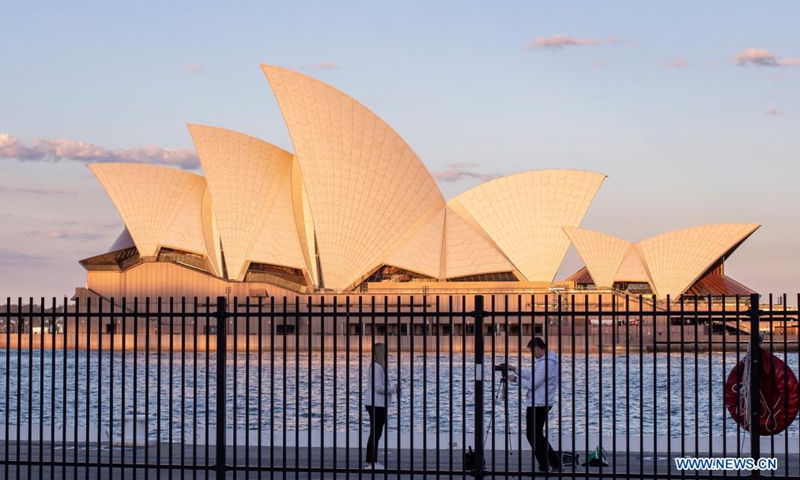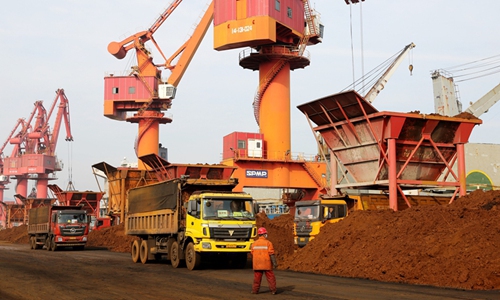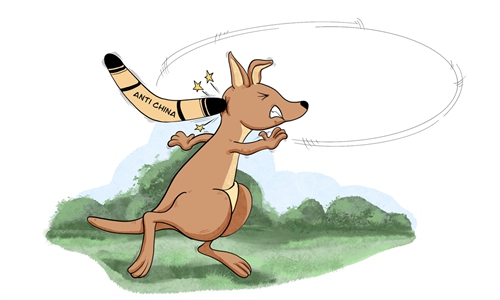Australia needs to heed rational voices and maintain independent foreign policy to fully realize strategic autonomy

People take photos near Sydney Opera House in Sydney, Australia, Aug. 20, 2021.Photo:Xinhua
"The Morrison government is wantonly leading Australia into a strategic dead end with its needless provocations against China," former Australian prime minister Paul Keating wrote in an article entitled, "The Morrison government is provoking China to please America." The article was published in the Financial Review on Friday.
Keating's criticism of the Morrison government hits the nail on the head, and very incisively points out the problems in the root causes of Australia's China policy. Since incumbent prime minister Scott Morrison took office, Australia has repeatedly provoked China, resulting in a slump in bilateral relations. It has completely tied itself to the US' anti-China chariot.
Some officials of the Morrison government have been relentlessly aggressive toward China in recent month. For example, Australian Ambassador to the US Arthur Sinodinos recently said the so-called China's coercion in the Indo-Pacific is now a bigger threat than September 11-style terrorism, the Financial Review reported.
Sinodinos and Australian Defence Minister Peter Dutton are prominent China hawks in the Australian political community. Their hard-line rhetoric toward China is based on a cold war mentality and zero-sum game, which has a negative impact in Australia and on the international community.
Hold important positions, these China hawks are among the vital right hands of Morrison in terms of diplomacy and national defense. They directly impact Australia's policies, including its China policy. Against this backdrop, Australia's China policy has evidently changed, and the country tends to view China as a threat rather than an opportunity. Canberra is seeing China in the manner of a zero-sum game rather than cooperation.
To these China hawks such as Sinodinos and Dutton, their hard-line rhetoric can help them gain more influence, so that they gain the support of domestic political forces and voters. Meanwhile, by provoking China, they can draw increasing attention from the US and cultivate themselves as "close friends of the US."
Apart from Keating, there are many other former political leaders expressing their dissatisfaction toward the Morrison government. For example, former Australian prime ministers Malcolm Turnbull and Kevin Rudd on August 10 urged the Austrilian federal government not to ramp up rhetoric against China for domestic political purposes, arguing it could harm social cohesion, according to the Guardian.
The conservatives have a strong voice in the Morrison government and can affect policies on many issues. Many Australian elites including Keating and Rudd have questioned the current government's strategy on China and provided rational advice. However, these voices are restricted to influencing media and public opinion, and have not exerted much practical impact on the China policies of the Morrison government.
However, it at least shows that Australian political elites do not remain on the same end of the spectrum regarding Morrison's hard-line China policy. There are still many rational voices. This is the hope for the possible improvement of China-Australia relations in the future.
This year marks the 70th anniversary of the signing of the Australia, New Zealand, US Security Treaty. Australia sees its alliance with the US as a cornerstone of its diplomatic and military defense policies and this is a consensus across the country.
But being an ally of the US and supporting the latter's strategic deployment does not necessarily mean that Australia has to follow the US' lead on all issues. Australia should have its own autonomy. However, the country has discarded its independence regarding its China policy. It closely follows the US and has even gone further than the US on some issues.
But how has the US responded to Australia's loyalty? Statistics show that the market share lost by Australian agricultural products in China provides an opportunity for US products to fill the gap.
Closely following the US' China policy can help Australia win the US' approval but it will eventually hurt Australia's own interests. Top Australian leaders should have a clear picture of this.
As Keating wrote in the article, "In the 1930s and 1940s, the conservatives put all their strategic faith in Britain. Now… they are placing their faith in the US." Australia seems to have "no faith" in its own ability.
It is not surprising to see Canberra lack confidence. Australia has a vast territory but a small population. In this context, it is not capable of defending its remote borders. Furthermore, it regards itself as a Western country but it is far from the US or Europe. It is close to Asia but holds a deep sense of mistrust toward its Asian neighbors. The above-mentioned factors push Australia to seek to an alliance with Western powers to defend itself.
Strategic autonomy is a goal of Australia's national strategy, but in terms of its national power, it would be hard to truly achieve it. But strategic autonomy is based not only on strength, but on the leaders' wisdom and capacity to deal with foreign relations. Unfortunately, the Australian leaders lack the will and determination to truly realize the country's strategic autonomy as they have become accustomed to the US' shield.
The author is an assistant research fellow at the China Institute of International Studies. opinion@globaltimes.com.cn



